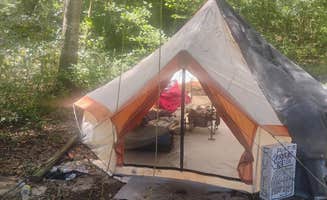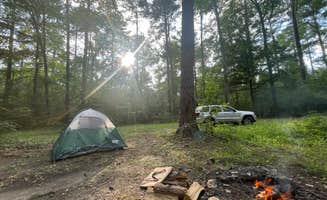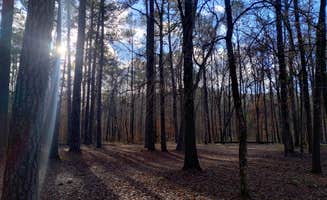Primitive camping near Morrow, Georgia centers around Wildlife Management Areas operated by the Georgia Department of Natural Resources. Most sites sit at elevations between 600-800 feet, creating moderate temperature variations between seasons. Summer nights typically remain above 65°F while winter camping can see temperatures drop below freezing. Access roads to most locations become particularly challenging after rainfall due to Georgia's clay-heavy soil composition.
What to do
Wildlife viewing opportunities: Joe Kurz Wildlife Management Area attracts wildlife enthusiasts during non-hunting seasons. "I enjoyed my stay here during the day," notes one Tyler Hunt Camp visitor, describing the peaceful daytime atmosphere before traffic increased at night.
Hiking available: Several areas offer informal hiking trails with varying terrain. At Ocmulgee River Camp, one camper reported "a nice horse trail to hike - saw some deer and a mystery black animal, maybe a boar or a bear - unsure." Trails may be unmarked and rugged in most locations.
Seasonal hunting: Many primitive campsites near Morrow operate primarily for hunters. "There are hunters around and we heard a good deal of shots," reported an Ocmulgee River Camp visitor. Camping during hunting seasons requires awareness of regulations and safety precautions.
What campers like
Minimal light pollution: Stargazing opportunities abound at primitive sites with limited development. One visitor to Tyler Hunt Camp described it as "quiet, super dark at night and beautiful," making it ideal for night sky viewing.
Weather variability: The Georgia climate allows for extended camping seasons. "It was nice and warm even in December! Almost 70 degrees!" reported a camper at Ocmulgee River Camp, highlighting the potential for winter camping in the region.
Wildlife encounters: Multiple campers report seeing deer and other wildlife. One Rum Creek WMA visitor noted their campsite was "perfect for tent camping" while appreciating the quiet setting conducive to wildlife observation.
What you should know
License requirements: Most primitive camping areas require proper documentation. "Must have a hunting or fishing license or a land use pass," explains a Rum Creek WMA visitor, confirming regulatory requirements for legal camping.
Road conditions: Access roads to dispersed camping vary significantly by location and weather conditions. "Very nice a bit bumpy on the drive in but no major holes," reports one Ocmulgee River visitor about road quality.
Inconsistent cell service: Connectivity varies dramatically between sites. Joe Kurz Wildlife Management Area has "no cell coverage" according to one camper, making advance trip planning essential for safety.
Variable nighttime activity: Some locations experience unexpected traffic after dark. A Tyler Hunt Camp visitor reported: "As night fell, I began preparing for bed, but I noticed vehicles coming and going—at least three within an hour."
Tips for camping with families
Pack extra water: No drinking water facilities exist at any primitive camping areas near Morrow. With summer temperatures regularly exceeding 85°F, families need minimum one gallon per person per day.
Choose seasonal timing carefully: Weather patterns affect camping comfort substantially. "It was quite hot but surprisingly not that buggy," noted one Concord Hunt Camp visitor, suggesting that even hot weather can offer reasonable conditions.
Scout multiple sites: Several areas have undefined camping boundaries, allowing flexible setup. "Open spaces and plenty of spots for camping" was reported at Ocmulgee River Camp, indicating room for family groups to spread out.
Tips from RVers
Access limitations: Most dispersed camping areas have unmarked boundaries and unimproved surfaces. "I went with a travel trailer," noted one Joe Kurz WMA camper, though most visitors report tent or small vehicle camping as more practical.
Self-contained systems required: No hookups or facilities exist at primitive sites. RVers must bring all necessary supplies and manage waste appropriately, with the nearest dump stations typically 15+ miles away in developed campgrounds.
Site selection challenges: Finding level, accessible spots requires planning. "Nice open camp site with plenty of spots for camping. Only a mile off the road," reported a visitor to Ocmulgee River Camp regarding the approach road quality.




